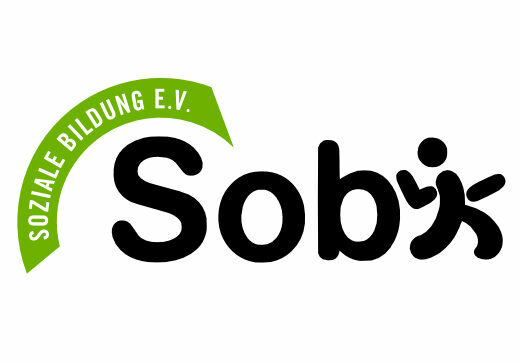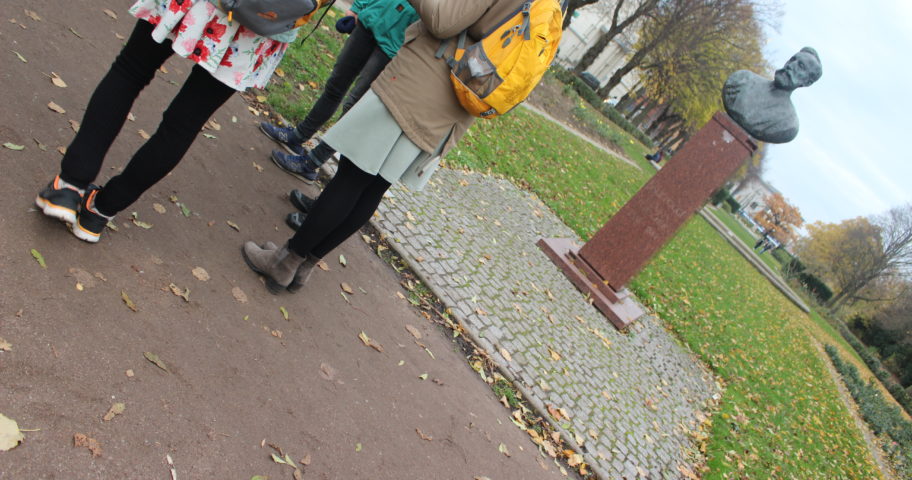A different guided city walk by the Initiative Rostock Postcolonial
Introduction / contextualisation
In cooperation with the initiative “Rostock Postkolonial”, Soziale Bildung e.V. offers since 2018 a city tour for school classes, volunteer groups, students and interested parties dealing with Rostock’s colonial past and postcolonial present. Therein, we refer to Germany’s role during the period of colonialization. Africa is mentioned as “a continent without own history” in the school syllabus for the subject history in Mecklenburg-Western Pomerania. But is this accurate?
Postcolonial initiatives exist in more cities all over Germany as well. The initiatives in Berlin, Hamburg or Freiburg are especially well known.
With this walk we want to build awareness for different perspectives and draw attention to linkages between the colonial past and the present. We want to make the serious scope comprehensible, which evolved during the colonial era and which still persists through manifested structures of power. How did and does for example racism as part of colonial thinking continue to have an impact on our society? And what have cacao and memorials in common?
Target audience
|
Adolescents and young adults 14 years and older as well as other interested parties |
Group size
|
6 to 20 participants |
Duration
|
2 to 3 hours |
| Costs |
Regular 20 € per event; individual solutions, such as donations possible |
| Booking |
6 weeks before the desired date |
| Location |
City centre of Rostock |
Meeting place
|
in front of the Peter-Weiss-Haus |
Docents
|
Two qualified young adults of the intiative Rostock Postkolonial |
Contents
Contents
Stations:
- Start at the Peter Weiss Haus; introduction on colonialism
- Anatomical collection in Gertrudenstraße; here we take up the subject research and medicine
- Paul Dogge memorial in Rosengarten; here we deal with memorials and street names
- In Breiter Straße we show the linkages between the colonial present, which can be seen there, and our contemporary consume patterns and commodities
Methods
Methods
By a combination of selected methods (e.g. positioning, memory, group work) we encourage non-discriminatory and conscious interactions between the participants. They can train their capacities for teamwork, such as equal communication behavior or grassroot approaches towards an equal participation of everyone. Intentionally, we reduce head-on teaching methods. As a result, concentration can be kept longer on a high level. Moreover, self-learning approaches and contents which are associated with own experiences will achieve more sustainable learning effects.
To make self-aquirement of these and further topics possible, we work on the app “(In-)visible Rostock”. The app contains texts, pictures and voice messages. Download the app here: app.soziale-bildung.org (you can find it in google playstore or use it as web app). Currently, you can find there a city walk which deals with the colonial past and postcolonial present of Rostock. More walks are to be followed.
Notes on booking
Notes on booking
Please contact us 6 weeks in advance, if you want to book a seminar. This interval/time span/deadline enables us to realize your requested date. For booking, please send us an e-mail and answer following questions:
- How many participants are to be expected?
- How old are the participants?
- To what extent can we expect prior knowledge?
- Do you want to embed the walk into a broader context, such as project days or a day of excursion?
Hint: As it can get cold during winter months, we recommend extra warm clothing.
The Initiative Rostock Postcolonial
The Initiative Rostock Postcolonial
Who we are? A network of people affiliated to the development policy education project of Soziale Bildung e.V. We are a diverse group that aims to be an advocate for a critical attitude towards colonial past and present in in the State of Mecklenburg-Western Pomerania, with focus on the university city Rostock. Since 2017 we researched and reconstructed contents related to postcolonialism. Furthermore, we offer city tours focusing on the contents we are dealing with.
Our motivation
- We want to be a part of an educational movement leading a public discourse, especially in schools, on an important period of German history.
- We think that colonialism shouldn’t be just a peripheral topic. The debate on this topic is often lacking an actual reference.
- Who is benefiting from continued colonial exploitation in many regions of the world nowadays? What kind of responsibility do we have?
- Reflecting upon the topic from a ‚critical whiteness‘ perspective and from a People of Color perspective are both very enlightening
Our objectives
- The initiative wants to arouse your interest in educational work with regional context. We want to focus on the roots of racism and activate the human sense of justice.
- The main objective of our initiative is to make the topic of colonialism as attractive as possible for actual communication practices. To achieve this, we are designing and developing an application for a city tour through Rostock.
- We want to come closer to a utopia of a less discriminatory and more diverse society and to start a dialogue in public areas. The realization of this utopia, in a more or less cohesive group, requires networking with already existing initiatives worldwide.
What we do
- We are searching for traces of the colonial rule of Germany, for traces of the impact of a colonial rule of Rostock and through that we try to deal with a part of history and commemorate it at the same time
- Evidence of the colonial background of places, memorials or institutions isn’t always visible. We want to build an awareness of the integration and linkage of colonial history and our present today. For example: How took racism effect on colonial thinking and how does it today?/How did and does racism as a part of colonial thinking continue to have an impact?

